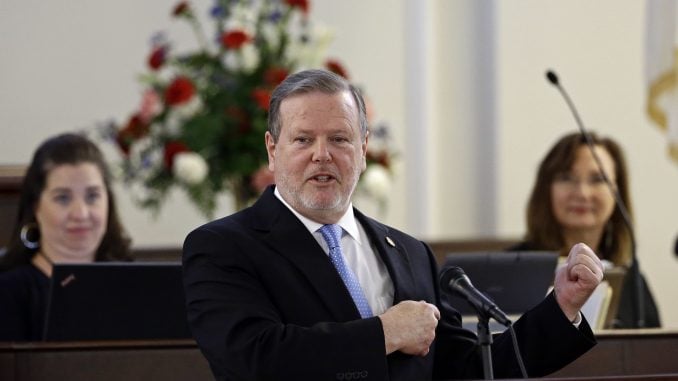
In his first two years in office Governor Cooper held a press conference surrounded by his far-left supporters to announce his intention to veto the budget passed by the General Assembly.
And this year, for the third year in a row, Governor Cooper has vetoed the most important legislation of the year.
At his press conference on June 28th, Governor Cooper said, “By the measures that matter to me, as well as most North Carolinians, this budget fails.”
According to that logic, tax relief, funding for public education and school safety are things that aren’t priorities and don’t matter to him.
Governor Cooper’s words aren’t exactly surprising, as he has said similar things in his veto press conference the last two years as well. But unlike 2017 and 2018 when his veto of a budget drafted by Republican legislators was a largely political statement, designed to score points with his political base, this time his veto could have repercussions that will negatively affect citizens all across North Carolina.
The political landscape in North Carolina in 2019 is changed. Republicans continue to hold majorities in the legislature but not supermajorities.
As I said in my opening remarks for the legislative session back in January, “For years, minority legislators had the freedom – even the luxury, some might say – of appealing to their base voters, their national political donors, and their ideological agenda-setters without responsibility for actual governance.”
Governor Cooper is still operating as if he has that freedom to appeal to his base voters with no consequences, but now he and legislative Democrats are responsible for the consequences of their actions.
As the Senate and House were negotiating the budget, we attempted to work with Governor Cooper on a compromise budget he would sign. Rather than engaging in a meaningful discussion, he refused to provide us with any specific counter-offers beyond a stated desire for Medicaid expansion and general philosophical opposition to certain proposed budget provisions, such as tax cuts.
Unless a sufficient number of Democratic legislators vote with their Republican colleagues to override Governor Cooper’s veto, none of the important priorities in the budget passed by the legislature will be advanced.
That means no 5 percent salary raise for most state employees and no 3.9 percent average raise for teachers. No funds to clear the rape kit backlog in our state or for the Human Trafficking Commission. It means the $4.4 billion slated to fund capital needs of our schools goes away as does the $1.4 billion in additional funding for public education over the next two years. And it means there will be no added dollars for 1,000 additional slots for personal care services and in-home assistance for intellectually and developmentally disabled North Carolinians.
And those are just some of the statewide items. If the veto is not overridden, the effects will be just as if not more consequential for counties, cities and towns across North Carolina.
Wake County for example will not receive more than $52 million in capital funding to repair and build schools. Wake Technical Community College will also miss out on $20 million in capital funds. And funds for other important items throughout the county, like $5 million for a veterans home and money for workforce-focused multi-campus centers, will also evaporate.
The story will be the same in communities throughout the state, but it doesn’t have to be.
Democratic legislators still have an opportunity to deliver for the citizens and families in their communities who sent them to the General Assembly. At some point soon, we will attempt to override the Governor’s veto and that’s when Democrats will have to ask themselves: what’s more important?
Their loyalty to their constituents or their political loyalty to Governor Cooper.


